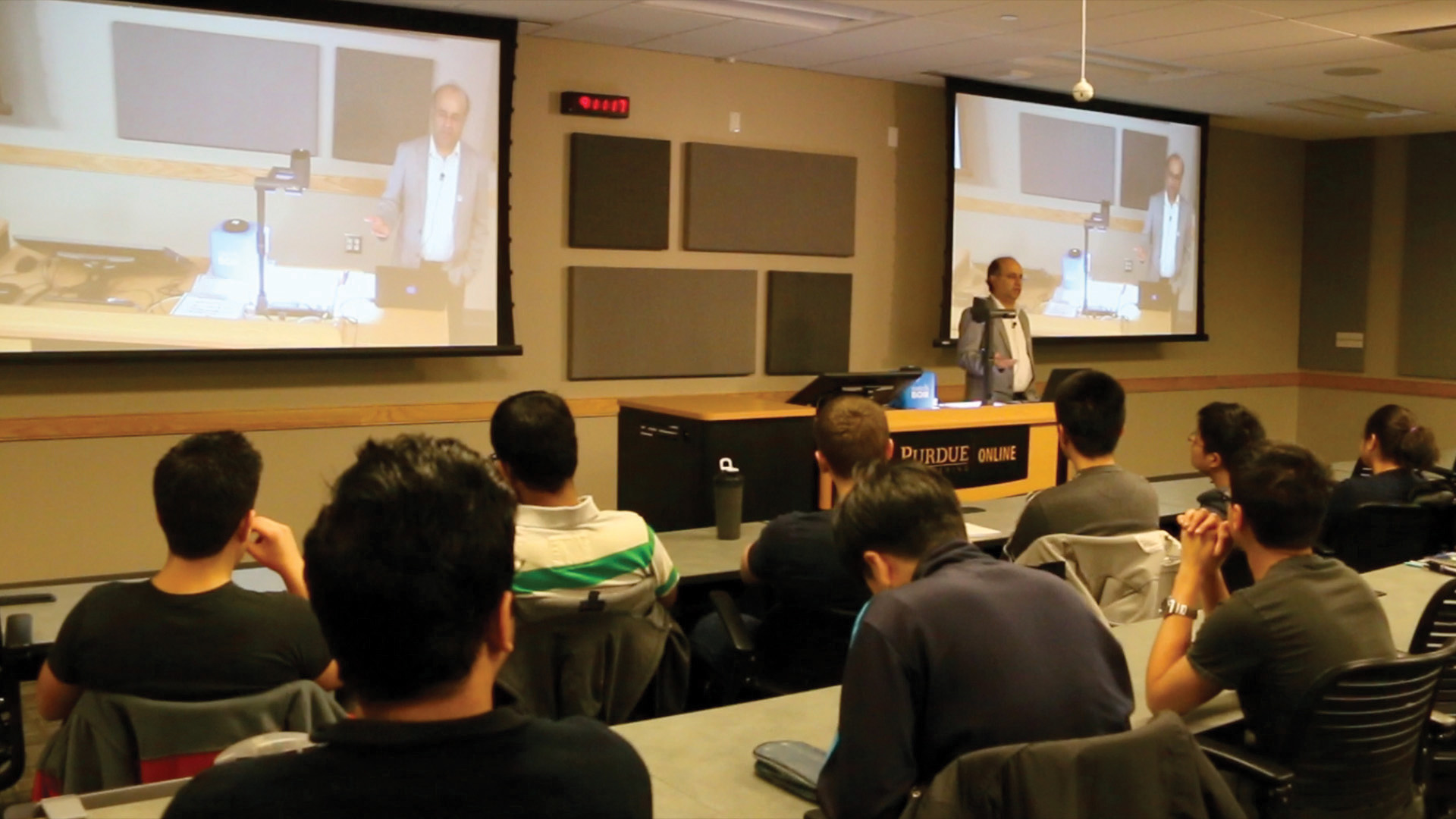What courses are available in the Online Master's?
The Online Master's at Purdue Mechanical Engineering gives you the ultimate flexibility. You have the freedom to choose any ME course you have an interest in, to further your career skills and knowledge.

Base Requirements
The Online MSME consists of 30 credit hours of graduate-level courses (50000-level and above) and includes 1-, 2-, and 3-credit hour courses. All courses must be technical and quantitative in content.
- Mechanical Engineering courses: a minimum of 15 credit hours must be ME courses.
- Graduate Math courses: 6 credit hours must be graduate-level math courses; 3 credits being directly from the Math department, and the other 3 can be from the approved applied math course list
- Technical Electives: up to 9 credit hours of graduate-level courses in engineering, math, or science. These could be mechanical engineering, or you could pursue classes in civil engineering, electrical and computer engineering, aeronautics & astronautics, or other technical subjects, as long as they are technical and quantitative in content.
- Not allowable: you can take these grad-level classes for your own personal enrichment, but they will not count towards your degree requirements.
You will create a plan of study (POS) during the 3rd-6th week of your first semester that lists the courses you plan to take and when you plan to take them. This is your initial plan and can be updated as things change, as long as changes keep you in degree compliance.
Online MSME Curriculum: Frequently Asked Questions
Is there a minimum course registration required each semester?
- You need to register for at least one credit to be considered an active student. If you do not enroll for more than two consecutive semesters, you will lose your student status and would have to reapply.
- While you can take extra courses each semester, at least one course every semester should be taken that can count toward degree requirements.
- Students pursuing the degree part-time, should enroll in no more than 1-2 courses a semester at most.
Are all courses available every term?
- No; most courses will be offered once a year. You can find the projected schedule of online courses at: https://engineering.purdue.edu/online/courses/school_listings
Are courses required during the summer?
- No. It’s your decision. There are very limited grad level engineering courses offered in summer. You can take math/statistics if you like. Please keep in mind, summer courses are very condensed, so it’s not recommended to take more than one course.
Can I take additional courses that don’t apply toward degree requirements?
- As long as you register in grad-level courses (500- or 600-level), you can take courses that don’t apply to your degree requirements before the end of your last semester. But you should always take at least one course a semester that does apply toward your degree requirements.
How are the online courses structured?
- Online engineering graduate students take courses asynchronously, meaning course content can be accessed from anywhere at any time. Students view the lectures and course materials weekly on their own schedule in order to complete the assignments and tests. There are due dates for assignments and exams, and these dates are listed on the course syllabi. Lectures are available for download and viewing two hours after the "live" lecture has been recorded.
Can courses taken at another University be transferred?
- Transfer courses may be accepted if they have not been used to meet another degree requirement, are grad-level (500- or 600-level), technical and quantitative in content, received a B or better grade, and were recently taken. Once you’re a registered student, you’ll submit your transfer course description/syllabus to the ME Grad Office for review, along with its Purdue-equivalent course syllabus. If it’s approved by ME, you’ll add it to your plan of study. Then the Grad School will review and make final decision on what they’ll accept. You can transfer no more than 6 credit hours of Mechanical Engineering or Math courses. We cannot tell you in advance of admission as to what courses will be allowed to transfer. Transfer credits will count toward your tech elective requirement of the degree.
Do I need to maintain a minimum GPA?
- You must complete all courses on your plan of study (POS) with a grade C or higher. If a course on your POS receives a grade lower than a C, it must be repeated for a better grade. You must have a GPA of 3.0 or higher to complete the MSME degree. Any semester a student receives GPA of 3.0 or lower, they will receive an academic reminder notice. The second semester a GPA below 3.0 is received, the student may be dismissed from the program. Graduate-level transfer courses are not included in your GPA calculation.
Is there a time limit to complete the degree?
- Most students will complete the online MSME in 1 to 4 years. However, you have up to 10 years to complete your degree. If you do not enroll after two consecutive semesters (approximately 1 calendar year), you will become inactive and must reapply to Purdue. To be in active status, at least one credit hour of registration is required.
